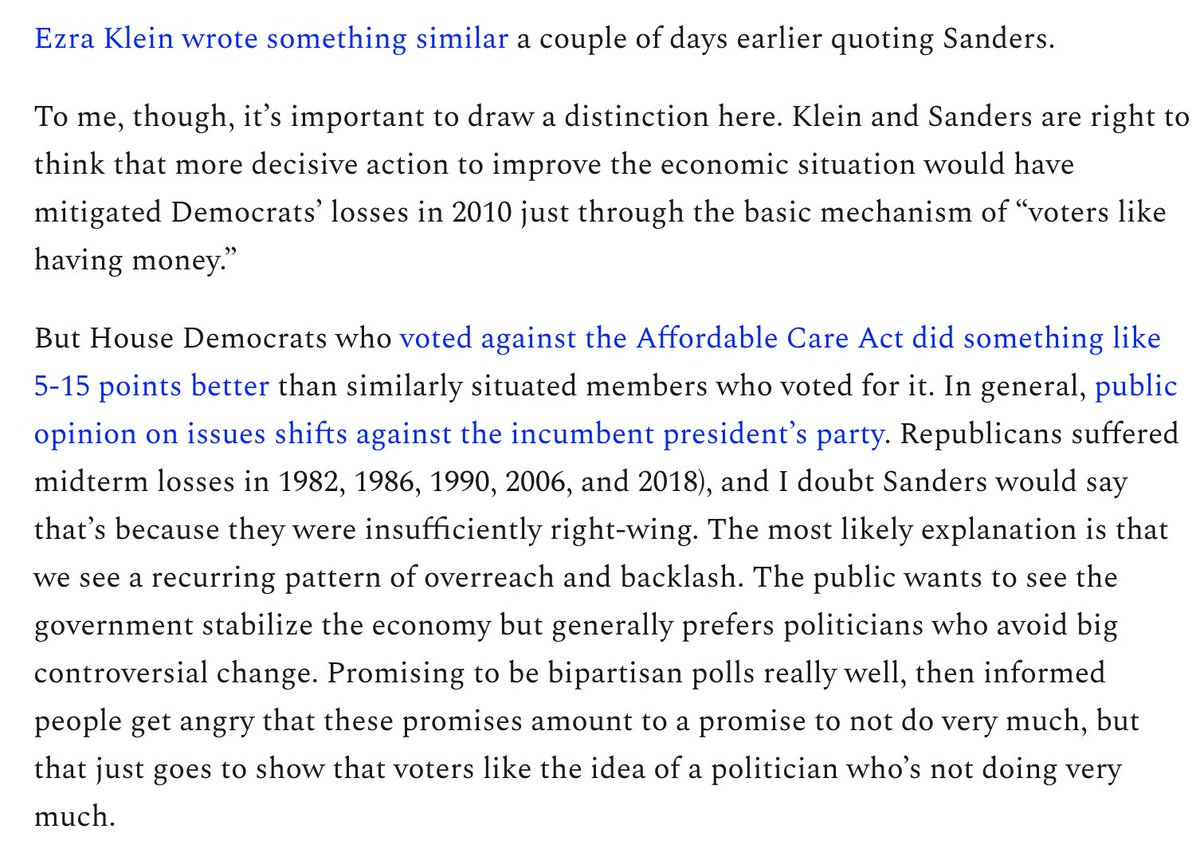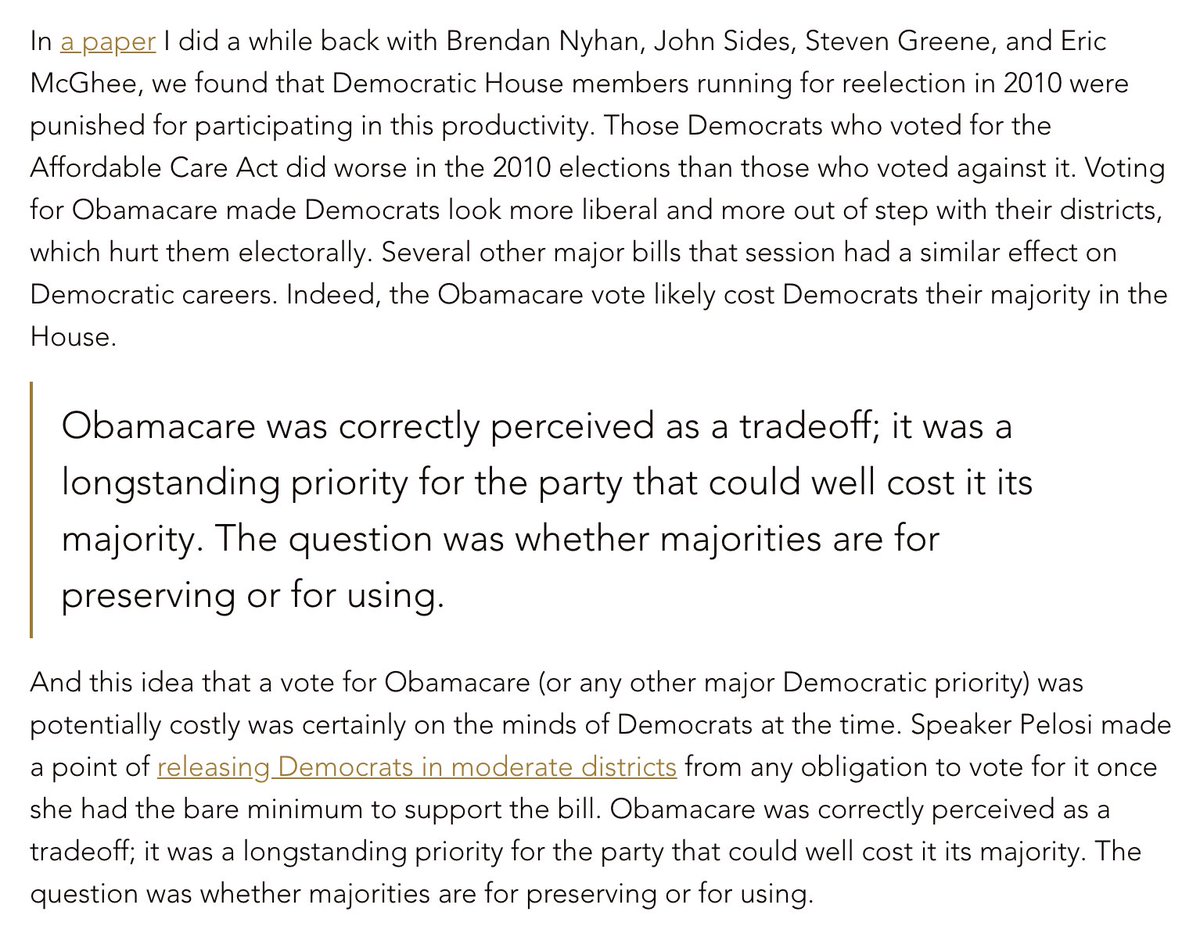So I've been reporting a story about how you'd fix the impeachment process. It doesn't work for removal, as currently designed. Impeachment was built for a political system without parties. It fails in a system with polarized parties.
I spent a long time talking to @LilyMasonPhD about this and basically talked myself out of the idea this is fixable.
Impeachment is not, historically, a way we convict and remove wayward presidents, and it never reliably will be.
More from Ezra Klein
My reporting here convinced me that there's no large effect in either direction on labor force participation from child allowances. Canada has a bigger one than either Romney or Biden are considering, and more labor force participation among women.
But what if that wasn't true?
Forcing parents into low-wage, often exploitative, jobs by threatening them and their children with poverty may be counted as a success by some policymakers, but it’s a sign of a society that doesn’t value the most essential forms of labor.
The problem is in the very language we use. If I left my job as a New York Times columnist to care for my 2-year-old son, I’d be described as leaving the labor force. But as much as I adore him, there is no doubt I’d be working harder. I wouldn't have stopped working!
I tried to render conservative objections here fairly. I appreciate that @swinshi talked with me, and I'm sorry I couldn't include everything he said. I'll say I believe I used his strongest arguments, not more speculative ones, in the piece.
I appreciate his intellectual curiosity and effort. I have quibbles. But my big disappointment is there was no mention of unintended consequences, which we discussed and which are kind of THE core conservative concern on this issue.
— \U0001d682\U0001d68c\U0001d698\U0001d69d\U0001d69d \U0001d686\U0001d692\U0001d697\U0001d69c\U0001d691\U0001d692\U0001d699 (@swinshi) February 18, 2021
STOP THE COUNT!
— Donald J. Trump (@realDonaldTrump) November 5, 2020
As @mashagessen explained in this interview, using Balint Magyar's framework, an autocratic attempt is "the first stage when autocracy is still reversible by electoral means."
The point is to make the regime's rule irreversible by electoral means, which is explicitly what Trump, et al, are trying right now.
"Then, at some point, there comes the autocratic breakthrough when you can no longer use electoral means to reverse that autocracy."
"Then autocratic consolidation, where it’s just consolidating ever more power and money, making it ever less possible to change."
There is an element of farce to Trump's tweets, his actions, his cronies. It makes it easy for many to discount what he's actually saying, and trying. https://t.co/GwC3KGbpkC
It's fitting for the internet era, when the worst ideas and figures come layered in irony.
— Brian Beutler (@brianbeutler) November 5, 2020
It's very in vogue to bash California and this doesn't even reach to some things that deserve scorn, like the continuing control of the Western States Petroleum Association and the state Chamber of Commerce in policymaking. And yet-https://t.co/vHZ6GM7QF8
— David Dayen (@ddayen) February 11, 2021
I think California is world leading on progressivism that doesn't ask anyone to give anything up, or accept any major change, right now.
That's what I mean by symbolically progressive, operationally conservative.
Take the 100% renewable energy standard. As @leahstokes has written, these policies often fail in practice. I note our leadership on renewable energy in the piece, but the kind of politics we see on housing and transportation are going foil that if they don't change.
Creating a statewide consumer financial protection agency is great! But again, you're not asking most voters to give anything up or accept any actual changes.
I don't see that as balancing the scales on, say, high-speed rail.
CA is willing to vote for higher taxes, new agencies, etc. It was impressive when LA passed Measure H, a new sales tax to fund homeless shelters. And depressing to watch those same communities pour into the streets to protest shelters being placed near them. That's the rub.

Over at Mischiefs of Faction, @Smotus makes a similar point: https://t.co/al6fS5tZXP

I want to be clear here: I’m saying that the Affordable Care act was, from a political perspective, badly designed, and that *a different health care plan* might’ve led to a better Dem performance in 2010. But these arguments don't grapple with that.
To @Smotus’s point, Pelosi released those House Democrats at the end, not the beginning. Having covered the beginning of this, I can tell you a lot of those Democrats thought a bipartisan health care bill would be great politics for them!
But they didn’t get that.
This is key. The ACA was built on the political theory that:
1. Bipartisan policy is easier to pass — and more popular once passed.
2. Working off of the Heritage Foundation/Romney template could get you a bipartisan health bill.
1 was probably right. 2 was utterly wrong.
More from Politics
Imagine, for a moment, the reaction of the UK Government, Brexiters, and the RW UK press if Juncker, Tusk, Macron or Merkel went on TV to say that Brexit was worth it to stop Freedom of Movement for UK citizens, and to stop Brits being able to come to the EU and jump the queue.
— Steve Bullock (@GuitarMoog) November 20, 2018
2/ Imagine if the EU said finally all those retired Brits in the EU27 could go home
3/ Imagine if the EU said finally all those Brits in the EU could stop driving down wages, taking jobs and stop sending benefits back to the UK
4/ Imagine if the EU said it was looking to use UK citizens as “bargaining chips” to get a better trade deal
5/ Imagine if the EU told UK citizens in the EU27 that they could no longer rely on established legal rights and they would have to apply for a new status which they have to pay for for less rights
You May Also Like
One of those strategies which I like is Iron Fly✈️
Few important points on Iron fly stategy
This is fixed loss🔴 defined stategy ,so you are aware of your losses . You know your risk ⚠️and breakeven points to exit the positions.
Risk is defined , so at psychological🧠 level you are at peace🙋♀️
How to implement
1. Should be done on Tuesday or Wednesday for next week expiry after 1-2 pm
2. Take view of the market ,looking at daily chart
3. Then do weekly iron fly.
4. No need to hold this till expiry day .
5.Exit it one day before expiry or when you see more than 2% within the week.
5. High vix is preferred for iron fly
6. Can be executed with less capital of 3-5 lakhs .
https://t.co/MYDgWkjYo8 have R:2R so over all it should be good.
8. If you are able to get 6% return monthly ,it means close to 100% return on your capital per annum.




















